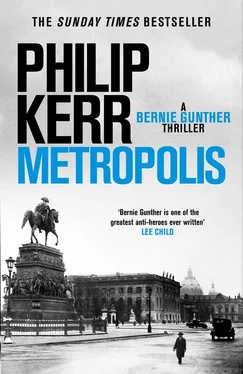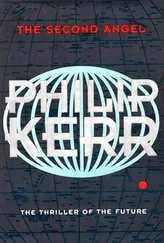‘I can imagine.’
‘I hope not, for your sake, Herr—?’
‘Angerstein.’
‘Eva’s father?’
He nodded.
‘I’m Sergeant Gunther, Bernhard Gunther, and I’m sorry for your loss.’
He nodded again, barely hanging on to his composure. ‘They cremated her before I even knew she was dead.’
‘We tried our best to trace the next of kin.’
‘Not that you’d have found me. I’ve been away.’ He glanced around pugnaciously as if trying to decide if he should punch the wall or me. ‘According to the locals they haven’t seen many cops down here since the night Eva was killed. So what brings you back?’ His voice was more animal than human, all bared teeth and smoked tonsils.
‘I’m looking for something.’
‘Mind telling me what?’
‘I’ll know it when I see it. Something I didn’t see before, perhaps. Until then, I don’t mind telling you at all. The job’s like that, Herr Angerstein. Like playing the tray game, you know? You keep on looking at it, then maybe later on, you’ll remember an object that you missed the first time.’
‘Eva wasn’t a whore, you know. At least not full-time. She had a good job. I just want you to know that.’ He took out his wallet, found a fifty-mark note, and tucked it into my breast pocket like a handkerchief. ‘Find her killer, son, clear her name, and there’s more where that came from. A lot more if you let me deal with him myself.’
I removed the crushed note and handed it back to him. ‘It’s rum I have on my breath, Herr Angerstein, not greed. So thanks, but I can’t take this. If I did, then you’d start to think I owed you something. You might feel sore about your fifty if I don’t catch the killer.’
‘Not catching him. Is that a possibility?’
‘It’s always a possibility when the killer doesn’t leave a name and address.’
‘Catch the bastard who killed her and I’ll give you something else. Something better perhaps.’
‘There’s nothing I want from you.’
‘Sure there is. You’re a copper, aren’t you? You catch him and you clear her name and I’ll give you the name of the man who burned down the Wolfmium factory. That’s fifty murders solved in one fell swoop. Maybe more — the final death toll isn’t in yet. I’ll give you his name and I’ll give you his address and I’ll even give you a reason why.’ He returned the fifty to his wallet. ‘Think about it. That’s the kind of collar that could make your career, son. Always supposing you’re interested in that kind of thing. The way you smell today, I’m not so sure about that.’
‘What makes you think it was murder?’
‘Let’s just say that I move in the kind of circle that occasionally overlaps yours. Or perhaps I should say, the kind of ring.’
The rings were professional criminal gangs, mostly in the north of Berlin, of which there were a great many, all with names, strict codes of conduct and sometimes distinctive tattoos. Organized crime, German-style. There wasn’t much professional crime in Berlin they didn’t have a finger in. They were powerful, too, with an influence that extended all the way into the Reichstag. I’d once seen the funeral of a ring leader, a gangster called Long Ludwig, and you’d have been forgiven for believing the Kaiser himself had died.
‘Which one?’
‘Now, that would be telling and I’ve told you enough for now. But I’ll tell you a lot more if you get a result, Gunther. If you find this bastard.’
‘Fair enough.’
‘What’s fair got to do with anything? If there was any fairness in this world my little girl would still be alive.’ He lit a cigarette and smiled a crocodile sort of smile. ‘ Fair , he says. Listen, son, this country — and this city in particular — is full of shit. And the shit keeps on piling up around our ears. Communists, Nazis, Junkers, Prussians, military men, pimps, drug addicts, perverts. You mark my words, Gunther, one day there’s going to be nowhere clean left for anyone to stand on and we’ll all be in the shit.’
And with that he walked off.
I’d walked the length and breadth of the courtyard when a man arrived with a barrel organ and started to play ‘The Happy Wanderer’, except it sounded about as happy as a wander across a field in Flanders. But some women came out of a door and started to dance with each other as if they were in a ballroom. The ballroom of Berlin, that’s what it was. With men in short supply, older women who wanted to dance were obliged to dance with each other. I had another look inside the coal bunker and inside the bole of the tree where I’d found Eva’s purse, but there was nothing.
Some kids were playing with a cripple-cart, which reminded me that it was probably the same one I’d seen abandoned on Wormser Strasse the night Eva Angerstein had been killed. Then, it had meant nothing; now, since Dr Gnadenschuss, it perhaps meant something. Why had the cart been abandoned in the first place? How would the disabled man who’d once used it have got around Berlin without it? A cart like that represented not just a means of transport but also a way of making a living. Just seeing it again begged all kinds of questions.
I walked over to the kids, showed them my beer token and confiscated the cripple-cart before shooing them off; I could more kindly have bought it from them, I suppose, for the price of a couple of ice creams, but I was feeling a little short. Turning down Angerstein’s fifty hadn’t been easy for a man like me.
I took the cripple-cart and examined it. There seemed to be nothing remarkable about it; it was made of wood, with a worn leather seat and four wheels taken off an old pram. It was only very gradually that I began to see things a little differently. The platform, which was meant for a legless man, was actually an artfully designed box on wheels, about forty centimetres deep, so that its occupant might have sat back on his haunches and presented his knees to the world as if they’d been the stumps of severed legs. The more I looked at the cart, the more I began to understand that the person using it hadn’t been a cripple at all but a swindler, a yokel catcher, a zhulik , a man posing as a disabled veteran for gain. There was a name painted on the inside, Prussian Emil , which sounded like an underworld name, the kind Angerstein might have used himself. I decided to speak to the disabled veterans I’d seen begging outside the station on Wittenbergplatz.
It was too early for the whores, but the sausage salesman was in the station entrance and he waved me over.
‘Hey, copper, I was hoping I’d see you again. I remembered something that might be useful to you. That girl who was scalped. The one who used to buy snow from me. Eva something. Couple of times she had a Fritz with her. Not a client, though.’
‘How do you know he wasn’t?’
‘He was queer, that’s how I know. Eva said his name was Rudi something. Geise, I think. That’s it, Rudi Geise. He came on his own a couple of times with a boy who looked like a girl with a prick and bought some dope himself. Said he worked at UFA Babelsberg and that some of the movie stars liked a bit of a lift when they were filming. Which was why he usually bought a lot of stuff from me. And carried quite a bit of money in his pocket. I asked him if it was safe carrying so much coal and he showed me a knife inside his coat. Not just any knife: a big fixed blade about twenty centimetres long, with a cross guard. Like he was planning to skin a bear or something. Said it was for show. But I don’t think it was the kind of show they have at the Wintergarten, know what I mean?’
‘Yes, indeed. Thanks for the tip.’
‘What’s with the wheels?’
‘I was looking for the two legless wonders I saw here the last time.’
Читать дальше












